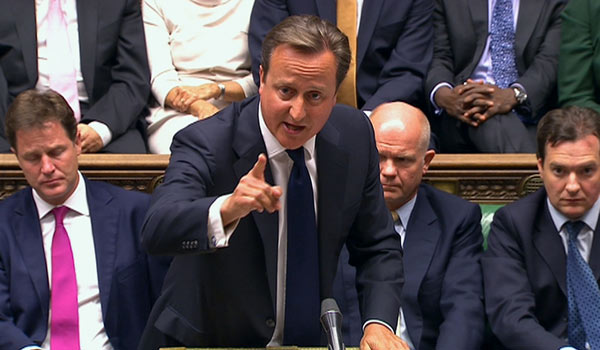Obama makes case for Syria strike, British house votes no
 |
|
Britain's Prime Minister David Cameron is seen addressing the House of Commons in this still image taken from video in London August 29, 2013.[Photo/Agencies] |
WASHINGTON/BEIRUT - The British parliament on Thursday rejected a motion supporting military action in Syria, reflecting deep divisions about using force to punish President Bashar al-Assad for what Western governments believe was his use of chemical weapons against civilians.
US officials conceded on Thursday they lacked conclusive evidence that Assad personally ordered last week's poison gas attack, and some allies have warned that military action without UN Security Council authorization risks making the situation worse.
President Barack Obama's top national security officials were due to brief Congress on Syria later on Thursday, but any intervention looked set to be delayed at least until UN investigators report back after leaving Syria on Saturday.
The British parliament's rejection of the largely symbolic motion proposed by Prime Minister David Cameron, which would have given authorization in principle for action subject to a second vote, was a setback for Obama's efforts to build a coalition for action.
Cameron said afterward he would not override the will of parliament and approve such action, saying it was clear that parliament did not want to see a military strike on Syria to punish it for chemical weapons use and that he would act accordingly.
White House spokesman Josh Earnest suggested before the British vote that the United States might be willing to act on its own.
"When the president reaches a determination about the appropriate response ... and a legal justification is required to substantiate or to back up that decision, we'll produce one on our own," Earnest said.
Syrian opposition sources said Assad's forces had removed several Scud missiles and dozens of launchers from a base north of Damascus, possibly to protect them from a Western attack, and Russia was reported to be moving ships into the region.
But expectations of imminent turmoil eased as the diplomatic process was seen playing out into next week, and the White House emphasized that any action would be "very discrete and limited," and in no way comparable to the Iraq war.
The United States and its allies have "no smoking gun" proving Assad personally ordered the attack on a rebel-held Damascus neighborhood in which hundreds of people were killed, US national security officials said.
In secret intelligence assessments and a still-unreleased report summarizing US intelligence on the alleged gas attack on August 21, US agencies expressed high confidence that Syrian government forces carried out the attack, and that Assad's government therefore bears responsibility, US national security officials said.
Syria denies blame for the gas attacks and says they were perpetrated by rebels. Washington and its allies say the denial is not credible.
Secretary of State John Kerry and Secretary of Defense Chuck Hagel were among senior US officials expected to brief congressional leaders later on Thursday. Some lawmakers complained they had not been properly consulted.
While UN chemical weapons inspectors spent a third day combing the rebel-held area where the attack took place, traffic moved normally elsewhere in Damascus, with some extra army presence but little indication of any high alert.
An extended parliamentary debate in London revealed deep misgivings stemming from the 2003 invasion of Iraq. After pressure from lawmakers, the British government - a key player in any proposed air assault on Syria - had promised parliament that even if it voted in favor, there would be a second decisive vote once the UN weapons inspectors report their findings.
Even that motion was defeated by 285 to 272 votes.
- Syria to 'decisively' respond to foreign military action
- Fifth US destroyer dispatched near Syria: report
- Russian Navy to rotate warships in Mediterranean
- UN should continue chemical weapons probe: Russia
- Britain sends jets to Cyprus as 'precautionary measure'
- Assad says to defend Syria against any aggression



























